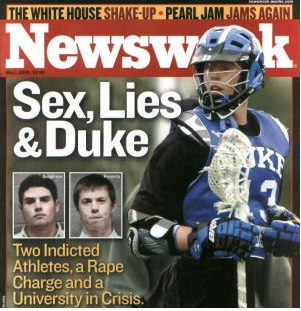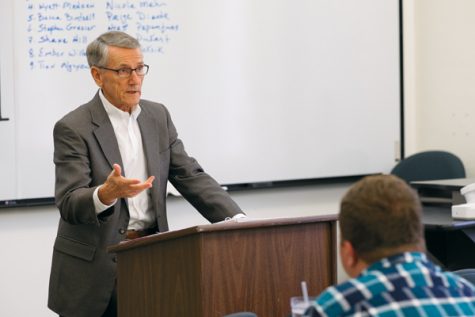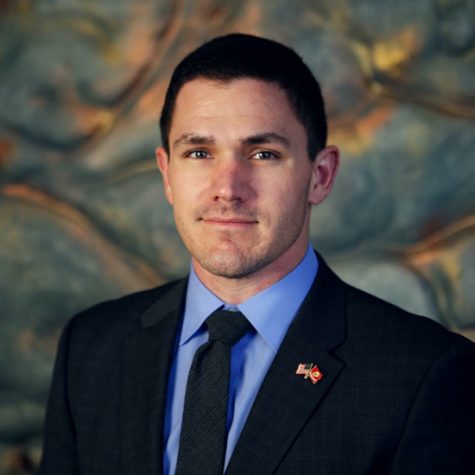Journalism and Duke lacrosse

Photo courtesy of barstoolsports.com
I recently watched “Fantastic Lies,” an ESPN “30 for 30” documentary covering the Duke lacrosse scandal from 2006.
Having graduated from high school the same year, I vaguely remember the event taking place. What stood out in my mind was how upset everybody was over the whole ordeal. As far as I can remember, whenever the event got brought up, everybody immediately assumed the lacrosse players had sexually assaulted the young stripper who visited their house that night.
I never thought too much of the assumptions taking place at the time. I just remember turning on the television and hearing talking head after talking head calling for the downfall of the Duke lacrosse team.
After watching the documentary last night, I now understand why I always saw people talking about their guilt.
The horrid way the news had been handled concerning the case was absolutely appalling. Even a columnist from the Durham, N.C., area, who was free to write how she saw fit, ended up apologizing in her paper to the players involved for essentially jumping to conclusions and accusing the players of sexual assault. In the documentary, she even admits “I guess we should have tapped our outrage and waited to see what the evidence showed.”
There were other factors at play, namely the district attorney pushing an investigation with no physical evidence for political reasons. But what sickened me the most was the manner in which the media reported the story. Television, print and the Internet were filled with articles condemning the players before evidence had even been presented.
Organizations on campus used the event to push their own agendas. They cried racism and demanded the entire lacrosse team be suspended for the allegations. Why did they assume the players had committed the acts? Because the news was telling them over and over again that the players were guilty. No question.
The documentary came to a close essentially condemning journalists. One man even went so far as to say, “There are no Edward R. Murrows left in the media… the Walter Cronkites are gone…they didn’t really care what the truth was.”
This was especially troubling to me. Not offensive, because I completely understand why the gentleman saying those words would argue that, but troubling because I have every intention of becoming a journalist. I take my future career, and in a lot of ways my current career, extremely seriously. It upsets me that these players had to experience this sort of mistreatment.
A journalist is more than an individual who sits outside of a courtroom and screams at lawyers, asking for a comment as they exit. A real journalist is a passionate person who becomes so enthralled in a subject they use any and all means within their power to uncover all related subject matter. They write a story and share it with the world, not to sell papers or increase their profitability, but to reach out to the public in the hopes their inspiration might inspire another.
In these times of back and forth, left and right, it’s often the voice of reason that is ignored. We no longer read the news and formulate our own opinion. Instead, we watch our favorite commentator on television and feel inclined to agree with their extremist views. Their voice inflections dig deep into our psyche and encourage an approving nod of our heads. We watch as round tables circled by members of organizations with separate agendas battle it out on live television, feeling more intelligent when their words strike inspiration to post a new Facebook status.
Now more than ever, it’s important to understand information. To simply listen and accept what we hear as fact has not only become irresponsible, but dangerous as well.
We live in a country that values its right to say what it feels when it feels it. While this right is a cornerstone to our way of life, it must not be abused. An initial idea is often overshadowed by strong emotions like hatred or excitement, and therefore requires a steady mind to truly evaluate the opposition.
Upon seeing an article, movie or television program that inspires you, resist the urge to consider a single source to formulate your own opinion. Read related material, even the material that disagrees with the original notion that inspired you to begin your research. Collect data to form a well-rounded and intelligent view, ensuring situations like the Duke lacrosse fiasco don’t happen again.
Matt Eidson is a columnist for The Dakota Student. He can be reached at stewart.eidson@und.edu








